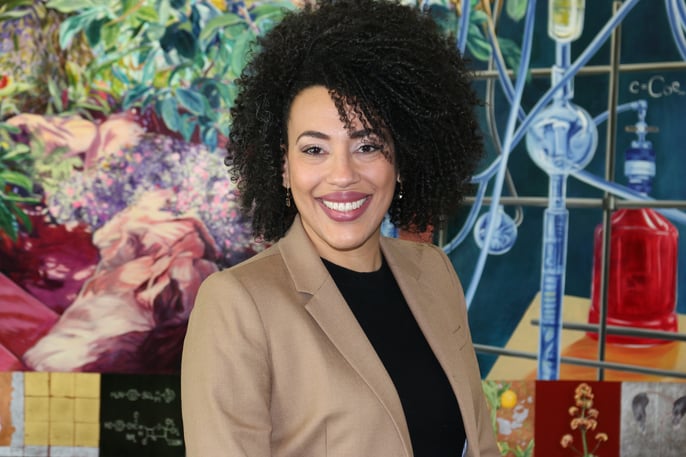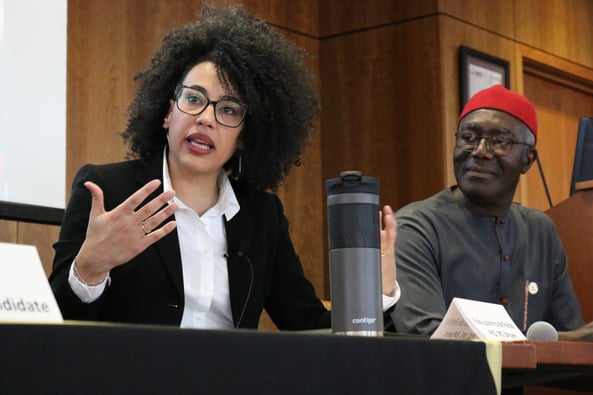Erika Freitas, PhD, inaugural Assistant Dean for Equity, Diversity, and Inclusion, wants to level set on her position title.
“To me, the order matters and it should be equity first,” she says, “because that’s where we have the potential to make more immediate impact. And without equity, diversity and inclusion will never achieve the needed depth for true transformation.”
Dr. Freitas is passionate about her work. She is originally from Brazil, the youngest of eight siblings, raised on dairy, cattle, and grain farm. Her family raised everything they ate, and all worked together to build a successful farm. There is a 17-year gap between Dr. Freitas and her next oldest sibling, and when she talks about her family, she radiates love for them and for her childhood.
“It was very interesting, growing up I felt like I had multiple parents, lots of folks to care for me,” she said. “But also, a lot of responsibility, because I have lots of people to report to!”
Dr. Freitas moved to the nearest town to go to school when she was seven years old because her father recognized that she was very smart and enjoyed books.
“I have always enjoyed school, and my dad was very proud of me for that,” she explained. “They were very invested in me, because I enjoyed it.”
Her dad passed away the year before she went to college, and the experience had a profound impact on her future career.
“My dad was very sick,” Dr. Freitas said. “And I really did not understand his medications… there were not many instructions on how to give them, on how to avoid side effects. Side effects were just something you had to live with. I still remember making my dad little bags of his medications, so he knew what to take for the day.”
Later, she learned that some of his side effects could have been reduced if they had more information on drug interaction, or what time of day works best to take specific medications.
“I really chose pharmacy because I felt like, ‘this is not fair’,” she said. “I really had that deep desire to help support others.”

Dr. Erika Freitas, inaugural CU Pharmacy Assistant Dean for Equity, Diversity, and Inclusion. |
Dr. Freitas completed both a bachelor’s degree and a master’s degree in her pursuit of better patient care. After graduation, she worked as clinical pharmacist in an interprofessional clinic, focused on patients living with HIV/AIDS. At first, the medical doctors didn’t understand the full benefits she could bring to the team, so they sent her only patients that refused to take medications, the ones that no one else wanted to work with because they were considered “difficult.” Those who refused to take their medication, and who the medical doctors considered to be a lost cause.
Dr. Freitas has a secret advantage. At the core of who she is, she sees people first and respect is a core value that she embeds in everything she does.
“Patients are not difficult. Patients are put in difficult situations sometimes in the healthcare system, when no one seems to have time to understand things from their perspective and explain things in a way that makes sense to them.”
She made time for those patients and soon enough, they were on track to restore their health.
“I needed to understand from their perspective how to best help them,”
In her eyes, she is a pharmacist expert on people taking medications, not an expert on medications, so she strives to understand the reasons behind patient decisions. After years of building patient and professional relationships, Dr. Freitas decided to move to the United States to pursue a PhD in Pharmacy Education at the University of Minnesota.
“I thought, I will come back after four years with more knowledge to continue to help my patients in Brazil,” she laughed. “And I am still here.”
She spent four years in Minnesota, and nine years at Regis University in Denver before joining the CU Pharmacy team.
“I didn’t know that I was Black until I came to the United States,” Dr. Freitas explained. “In Brazil, we define race relations differently, and I was very much sheltered. When I moved to Minnesota, then I realized something was off by the way that people treated me.”
Dr. Freitas describes with vivid details her encounters with discrimination and racism in the United States, but what really motivated her to center her work on equity, diversity, and inclusion was how she was embraced by people of color.
“They cared about me,” she said. “And it felt good, so I thought I should retribute the love.”

Dr. Freitas speaks at the Black History Month Panel discussion. |
Dr. Freitas is a strong advocate for belonging and she contrasts that feeling with the idea of ‘fitting in.’
“I dislike the term ‘fit in’.,” she explained. “Where ‘fitting in’ expects you to assess and change to match the environment around you, belonging tells you that there is room for you in that space, exactly like you are.”
Dr. Freitas is invested in preparing culturally responsive healthcare professionals, ready to address health disparities.
“Understanding how services might change according to the patient’s race or ethnicity, for example,” she explained. “And if you look at patient outcomes, there is so much more than straight science on how we treat people.”
Dr. Freitas has experienced unethical medical treatment firsthand.
“This work is personal,” she said. “This is a very personal work for me”, she said. “I did not choose it, I was chosen When I started to see and experience the unfair treatment, knowing that I had crossed a certain educational threshold, I started to feel that I was a little bit more responsible for using my education, my credentials, the airspace that I get to help others.”
Dr. Freitas is creating space for that knowledge and growth in the school of pharmacy. For her, for others like her, for faculty members, students, staff, and anyone who wants to come to the table.
“The focus of higher education has always been on ‘are students ready to learn?’ It is now time for us to start asking ourselves, ‘are we prepared to teach? Are we prepared to support students from diverse backgrounds? We need to reflect on ourselves and ask those questions. Are we prepared to teach and work in an inclusive way, so that everyone has a chance at succeeding?”
With Dr. Freitas, we will be.



.png)